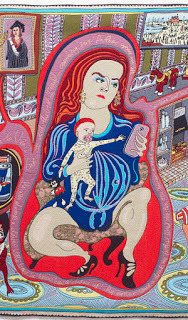Divisive Devices
Follow @alexlydiate
You'll have noticed, I imagine, that many people spend a great deal of time staring at their telephones.
Last week I had the dubious fortune of eating lunch at a branch of IKEA (I believe it is on-brand and mandatory to shout the name). As I watched the crowds with their Swedish horse-balls and chips, I noticed that almost all of them were staring at their telephones whilst eating.
It reminded me of a passage from Walpola Sri Rahula's book What the Buddha Taught:
"Sometimes you see a man in a restaurant reading whilst eating. He gives you the impression of being a very busy man, with no time even for eating. You wonder whether he eats or reads. One may say he does both. In fact, he does neither, he enjoys neither. He is strained, and disturbed in mind, and he does not enjoy what he does at the moment, does not live his life in the present moment, but unconsciously and foolishly tries to escape from life."
That was written sixty years ago, and written from a philosophy formalised over two and a half millennia before. It foretells an epidemic.
 Detail from The Adoration of the Cage Fighters,
Detail from The Adoration of the Cage Fighters,
Grayson Perry 2012Grayson Perry's exhibition The Vanity of Small Differences toured through Bath in recent months. One of the pieces tells a cautionary story of this epidemic, a child grasping towards his mother's smartphone. After we toured around the tapestries in the Victoria Art Gallery my wife and I took our daughters upstairs, where they could make some art for themselves. There the scene echoed around the room, with children wrestling against bright electronics for their parent's attention.
The kids will, of course, survive. These are not the worst trials a childhood has been forced to negotiate. The tragedy lies in the loss of our awareness.
Rahula's man in the restaurant read a book to try and escape from his life. Unlike a book, our devices are not passive, they are in some sense aggressive. Algorithms feed us what they deduce we wish to consume. They do not hide this intent; they even use the word feed. The artificial intelligences learn our desires and use them against us, to drag us from our meals, our children, our lives. Our consciousness is held in thrall, blanched by an endless and contracting loop of what we already believe. We engage daily, hourly, by the minute, in a complicit narrowing of our minds, inviting the machine to entwine and constrict our synapses.
We are divided from each other by our little machines, but more dangerous still, we allow them to divide ourselves. We want them to do it. We can no longer consider ourselves whole.
You'll have noticed, I imagine, that many people spend a great deal of time staring at their telephones.
Last week I had the dubious fortune of eating lunch at a branch of IKEA (I believe it is on-brand and mandatory to shout the name). As I watched the crowds with their Swedish horse-balls and chips, I noticed that almost all of them were staring at their telephones whilst eating.
It reminded me of a passage from Walpola Sri Rahula's book What the Buddha Taught:
"Sometimes you see a man in a restaurant reading whilst eating. He gives you the impression of being a very busy man, with no time even for eating. You wonder whether he eats or reads. One may say he does both. In fact, he does neither, he enjoys neither. He is strained, and disturbed in mind, and he does not enjoy what he does at the moment, does not live his life in the present moment, but unconsciously and foolishly tries to escape from life."
That was written sixty years ago, and written from a philosophy formalised over two and a half millennia before. It foretells an epidemic.
 Detail from The Adoration of the Cage Fighters,
Detail from The Adoration of the Cage Fighters,Grayson Perry 2012Grayson Perry's exhibition The Vanity of Small Differences toured through Bath in recent months. One of the pieces tells a cautionary story of this epidemic, a child grasping towards his mother's smartphone. After we toured around the tapestries in the Victoria Art Gallery my wife and I took our daughters upstairs, where they could make some art for themselves. There the scene echoed around the room, with children wrestling against bright electronics for their parent's attention.
The kids will, of course, survive. These are not the worst trials a childhood has been forced to negotiate. The tragedy lies in the loss of our awareness.
Rahula's man in the restaurant read a book to try and escape from his life. Unlike a book, our devices are not passive, they are in some sense aggressive. Algorithms feed us what they deduce we wish to consume. They do not hide this intent; they even use the word feed. The artificial intelligences learn our desires and use them against us, to drag us from our meals, our children, our lives. Our consciousness is held in thrall, blanched by an endless and contracting loop of what we already believe. We engage daily, hourly, by the minute, in a complicit narrowing of our minds, inviting the machine to entwine and constrict our synapses.
We are divided from each other by our little machines, but more dangerous still, we allow them to divide ourselves. We want them to do it. We can no longer consider ourselves whole.
Published on May 31, 2016 14:26
No comments have been added yet.



